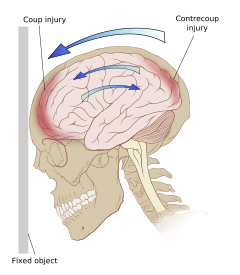Concussions and Post Concussion Syndrome
Post-Concussion Syndrome
Most of our clients come to us as the result of moderate to severe car and truck accidents and all too frequently the victims will have questions about the consequences of concussions.
Concussions can result from impacts where you are “knocked silly” to crashes where you are knocked out cold. They both result from an organic injury to the brain, even though the MRI or CT scan may have come back clear at the hospital. Post-concussion syndrome is a diagnosis for people with minor closed head injuries. The complaints I have heard from clients usually run like this:
- “I was driving home and I suddenly did not know where I was.”
- “I was playing a hymn on my guitar that I have played for 40 years and I suddenly did not know the lyrics.”
- “I normally have no problem recalling which projects a project manager worked on but now I have no idea.” (they have lost the mental map that associates one person with a theme)
- “My son has changed and is angry and screams all the time now.”
These are statements from real clients reflecting the fear and frustration that these families go through. Post-Concussion Syndrome happens in car crashes because there is a difference in the timing and direction of the movement of the skull versus the brain. The brain is housed in the skull without any structural connection to the skull. It is suspended in fluid and moves independently. When the skull moves suddenly, the brain is compressed at the trailing edge and then when the skull stops suddenly and whipsaws back, the brain impacts the skull again. This is the coup, contrecoup motion. Studies have shown that this motion can cause bruising (contusions) and shearing of the parts of the nerve cells. (axons)
Some of the symptoms are held in common with other diagnoses including mood disorders and ADHD. The symptoms of post-concussion syndrome include:
- fatigue
- impulsiveness and short temper
- memory problems
- persistent, recurring headaches
- searching for well know, often used words.
- dizziness
- personality shifts
One of the common frustrations we hear from our clients is that their primary care doctors or neurologists have diagnosed them with a mild TBI or post-concussion syndrome but have offered no “cure.” The usual advice is that time will heal the injury and that there is some medication developed for treating Alzheimer’s patients that you can take. This is not very comforting but with the current level of sophistication for brain scans, it is a conversation many people have with their doctors. This begs the question; what should I do about my post-concussion syndrome?
There are a number of neuropsychologists in the Atlanta, Georgia area that are experienced in diagnosing a mild TBI through cognitive testing. If they do identify an organic brain injury, there are a number of options. For example, the Shepherd Spinal Center in Atlanta is a recognized leader in dealing with brain injuries of all types. They have an Acute Mild Brain Injury program that specializes in tailoring cognitive and occupational therapy for Georgia patients suffering from post-concussion syndrome.
You may contact Shepherd at www.shepherd.org or (404) 352-2020.
Example Cases
Ellwood v. Wighwick, Sept. 2015 – jury verdict for the defense
This was a trial brought by Webb, Zschunke contending that the plaintiff sustained a concussion with permanent vertigo. I imagine that the lawyers tried to get the client to accept the $30,000 offer on $13,000 in medical bills and $9,800 in wages because this was a low property damage case. In our experience, juries will accept concussion claims from good impact cases with solid medical evidence. As a general rule though, it is very hard to get a jury to believe a concussion occurred with a low impact and a several-day gap in care after the crash.
The same rule that applies for physical injuries applies doubly for concussion claims.


